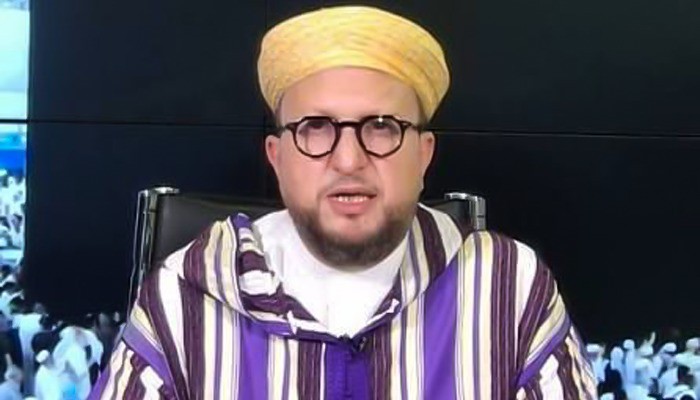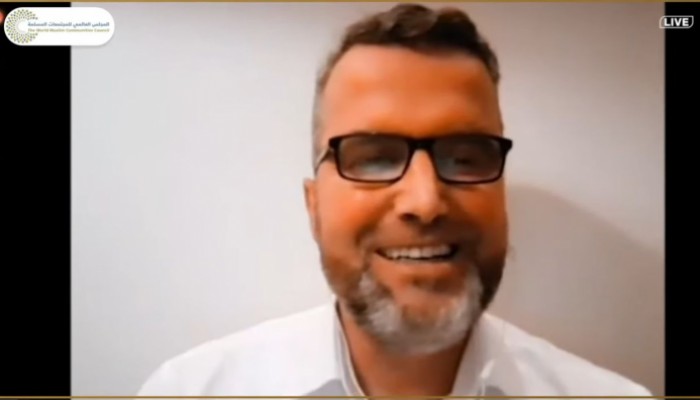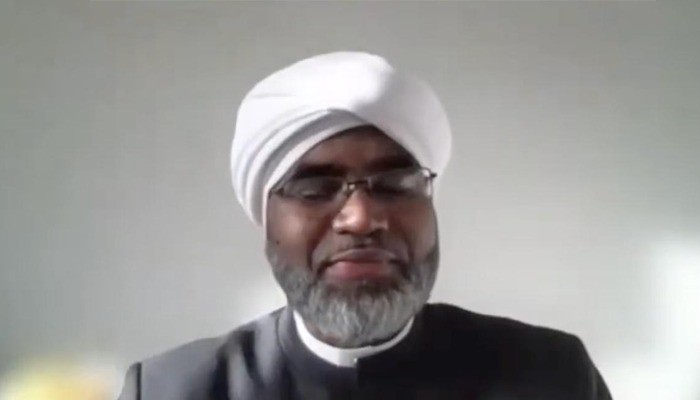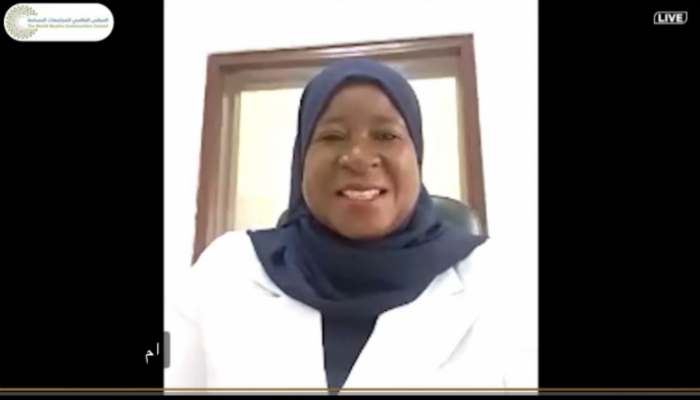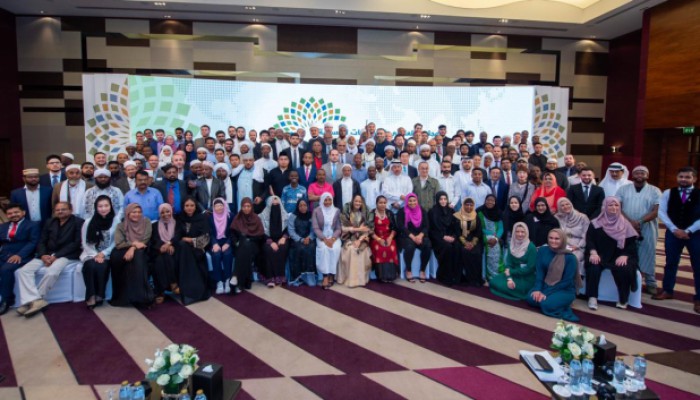
The Closing Statement and Recommendations of the First Forum for Youth of Muslim Communities “Building Future Leaders: Commitment, Integrity, and Innovation”
- 2019-Dec-08
Throughout the 7th and 8th of December 2019, more than 200 youth of Muslim Communities have met from all over the world from the Fiji Islands to Uruguay and Brazil, and from New Zealand to Estonia and Lithuania. Wise men, experts, politicians, and former and current ministers within the same communities have also participated in the dialogue. The dialogue was extremely rich and profound, combining the youthful thought, aspirations, and dreams of the youth on one hand, and the elder’s wisdom, experiences, and deep expertise on the other hand.
The forum, which was opened with speeches by H. E. Dr. Ali Al-Nuaimi, Chairman of the World Muslim Communities Council, H.E. Dato Dr. Koutoub Moustapha SANO, Minister in the President Office and Diplomatic Advisor to the President, Presidency of the Republic of Guinea and H.E. Alyautdinov Ildar, Mufti of Moscow, the Russian Federation. Then, the dialogue started over 6 sessions that covered a variety of topics and in which youth and adults, women and men have participated. The following themes were addressed through panel discussions: How To be a Future Leader, Citizenship and Faith in the Age of New Media, Community Engagement, Inter-faith Practice and Social Inclusion, Updating the Software: New Approaches to Islamic Jurisprudence, Education, and Etiquette, Innovation, Entrepreneurship and Philanthropy: Building New Generation of Muslim Leaders and Inspiring Future Leadership: Stories of the Achievers. Finally, some examples of the youth’s success that would inspire young people to lead the future were presented there.
The forum was concluded with emphasizing a set of recommendations:
First: The attendees thanked, with gratitude and appreciation, the UAE and its inspiring leadership which is always occupied with the future, and keen to support Muslim communities, secure their future, and maintain its stability and prosperity within their countries, and which works in a tireless manner in order to revive and consolidate the original Islamic values that would achieve peace, security and stability within communities, and promote the values of tolerance, coexistence and cooperation among all human beings.
Second: The challenges faced by Muslim communities make it necessary to empower young men and women to lead the future and the institutions in their communities, along with supporting their ideas, vision and aspirations. Many of these communities have suffered from patterns of leadership that do not belong to them, nor established in them, and which came with concerns, problems and crises of other communities. Then, these leaders subjected many Muslim communities by stagnant ideas that have nothing to do with the reality of these communities in which they live, and which meet not their needs nor answer their questions or fulfill their ambitions.
Third: The youth’s ability to lead their communities will represent the true solution to many problems and crises, since these young people have been brought up within multi-religious, intercultural and multiracial communities, so they know how to achieve the values of coexistence, tolerance and cooperation with the followers of other religions, with whom they share the homeland, communal living and dreams.
Fourth: To achieve the true empowerment of youth to lead Muslim communities, charitable and financing institutions must work on creating a state of sustainability in the institutions of Muslim communities that in turn is created by young people. To achieve this, a new vision is needed in order to finance these institutions, achieve their sustainability, and ensure they are not subjected to foreign agendas or outside political interests. This can be maintained through the establishment of charitable endowments in accordance with the laws, provisions and regulations of the countries in which they are located in order to ensure their sustainability and independence, and to achieve the true goals of Muslim communities.
Fifth: Emphasizing the importance of building competences and preparing leaders in a real scientific way, by establishing institutions to prepare, train, re-train and enabling all those working in the religious affairs, whether teachers, Imams and preachers, directors of Islamic centers or others. They should be trained in a real scientific manner according to the systems and norms in their communities, which are followed by those belonging to other religions and sects, and recognized by the education and training systems in their countries.
Sixth: Emphasizing the transition from a state of self-isolation to a state of openness to the nation’s partners and community neighbors, by making Islamic centers a public space to serve local communities and provide services to all those in need, and to all those who are willing to benefit from them. The Islamic centers may set its standards and procedures, provided that they are consistent with the laws and regulations of every community and its country.
Seventh: The need to create a space for joint work with community partners by providing the shared Islamic values with other religions in the community, such as focusing on family values, cooperation, caring for the needy, preserving the environment, volunteering and charitable work... etc. This will achieve coexistence and cooperation, and contribute to promoting tolerance and treating the negative problems such as violence along with ethnic and religious hostility.
Eighth: Confirming the necessity of reforming and developing religious discourse in all Muslim communities in a manner that is commensurate with the needs and requirements of each community, so that religious discourse, whether in mosques or educational circles, is consistent with the cultural level of that community and is able to answer the questions and doubts of youth in particular, and community in general.
Ninth: Emphasis on the privacy of each Muslim community, and that the challenges that it faces are multiplied by the multiplicity of its states and regions, and the multiplicity of levels of development and the challenges experienced by its countries. As there are Muslim communities that the problem of Islam phobia represents a real challenge for them, while there are communities that do not know about this problem at all, but they have other problems related to totally different issues such as poverty, health and sanitary.... etc.
Tenth: Emphasizing the importance of employing all kinds of media, new and old, to correct the image of Islam and Muslims, by presenting a new image of Muslims in order to wipe out the old one that dominating in the media in the last two decades from September 11, 2001 till today. However, this requires multimodal, professional and deep media work that would achieve the desired goals according to current and future international standards, and through its language and means.
Eleventh: The attendees call for the necessity of organizing this forum periodically to ensure that the youth’s voice, vision, aspirations and dreams are being heard and able to lead their communities. They are the most capable and most worthy of it and the responsibility of making their future should be undertaken by them. Therefore, they have the full right to be a part of the future-making leadership in their communities since it is the very same future of their families and children. It is not reasonable to let others, who may not understand them well, to impose it on them.
Twelfth: The youth calls for the establishment of a general secretariat for the youth of Muslim communities, which would represent a incubator of experience, and a springboard for creating a prosperous future for Muslim communities, made by its youth.
In conclusion, the participants would like to thank the World Muslim Communities Council and its Chairman, H. E. Dr. Ali Al-Nuaimi along with the teamwork in the Council for organizing this event and its good management.




